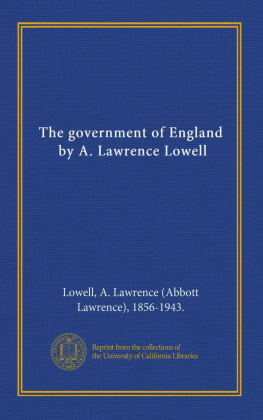STUDYING SOCIETIES AND CULTURES
Studies in Comparative Social Science

A series edited by Stephen K. Sanderson

Titles Available
Revolutions: A Worldwide Introduction to Political and Social Change, Stephen K. Sanderson (2005)
Plunging to Leviathan? Exploring the Worlds Political Future, Robert Bates Graber (2005)
The Depth of Shallow Culture: The High Art of Shoes, Movies, Novels, Monsters, and Toys, Albert Bergesen (2006)
Studying Societies and Cultures: Marvin Harriss Cultural Materialism and Its Legacy, edited by Lawrence A. Kuznar and Stephen K. Sanderson (2007)
STUDYING SOCIETIES AND CULTURES
MARVIN HARRISS CULTURAL MATERIALISM AND ITS LEGACY
edited by
Lawrence A. Kuznar
and
Stephen K. Sanderson
First published 2007 by Paradigm Publishers
Published 2016 by Routledge
2 Park Square, Milton Park, Abingdon, Oxon OX14 4RN
711 Third Avenue, New York, NY 10017, USA
Routledge is an imprint of the Taylor & Francis Group, an informa business
Copyright 2007, Taylor & Francis.
All rights reserved. No part of this book may be reprinted or reproduced or utilised in any form or by any electronic, mechanical, or other means, now known or hereafter invented, including photocopying and recording, or in any information storage or retrieval system, without permission in writing from the publishers.
Notice:
Product or corporate names may be trademarks or registered trademarks, and are used only for identification and explanation without intent to infringe.
Library of Congress Cataloging-in-Publication Data
Studying societies and cultures : Marvin Harriss cultural materialism and its legacy / edited by Lawrence A. Kuznar and Stephen K. Sanderson.
p. cm. (Studies in comparative social science)
Includes bibliographical references.
ISBN-13: 978-1-59451-287-2 (hc)
ISBN-10: 1-59451-287-6
1. Harris, Marvin, 19272. AnthropologistsUnited StatesBiography. 3. EthnologyPhilosophy. 4. Culture. 5. Social evolution. I. Kuznar, Lawrence A. II. Sanderson, Stephen K.
GN21.H37S88 2006
301.092dc22
[B]
2006021982
ISBN 13 : 978-1-59451-287-2 (hbk)
ISBN 13 : 978-1-59451-288-9 (pbk)
Designed and Typeset in Adobe Garamond by Straight Creek Bookmakers.
Contents
Lawrence A. Kuznar and Stephen K. Sanderson |
Pamela Effrein Sandstrom and Howard D. White |
James Lett |
H. Sidky |
Alan R. Sandstrom |
James G. Peoples |
P. Nick Kardulias |
Melvin Ember and Carol R. Ember |
Lawrence A. Kuznar, William G. Frederick, and Robert L. Sedlmeyer |
James W. Dow |
Stephen K. Sanderson |
Robert L. Carneiro |
David P. Kennedy |
Stephen K. Sanderson |
Douglas Martin |
Maxine L. Margolis and Conrad Phillip Kottak |
T HIS VOLUME BRINGS TOGETHER papers on the scientific research strategy known as cultural materialism, which was developed primarily by the anthropologist Marvin Harris (19272001) in the 1960s and 1970s. It has been both very influential and highly controversial. Harris taught at Columbia University from 1953 to 1980, when he took a position at the University of Florida, where he remained until his death. Harriss substantive work ranged from exploring the social variability of racial classifications in Brazil and Mozambique, to explaining the origin of the state, warfare, male dominance, food preferences, and cannibalism, to uncovering the causes of culture change in contemporary American society. Harris fought tirelessly against approaches that he thought were theoretically wrong, such as ethnoscience and sociobiology, or scientifically untenable, such as Lvi-Straussian structuralism and interpretivism. He was most alarmed by the rise of postmodernist approaches in anthropology during the 1980s and 1990s, and he combated their influence in numerous publications. Harris was most opposed to their denial of the special epistemological status of science and their moralistic, politicized, and therefore biased nature.
In the wake of Harriss death in October 2001, three symposia were held at national and regional meetings in which the participants provided a retrospective on Harriss influence and the likely future contributions of his ideas. One symposium, Marvin Harris and the Controversy Surrounding Cultural Materialism: Retrospective and Future Potential, organized by Joyce Lucke and Lawrence A. Kuznar, was held at the 2002 annual meeting of the Central States Anthropological Society in East Lansing, Michigan, and followed up at the 2002 American Anthropological Association annual meeting in New Orleans. The other symposium was also held at the 2002 American Anthropological Association annual meeting and was entitled Culture, People and Nature: The Role of Marvin Harris in Anthropological Theory and Practice. This session was organized by Maxine Margolis and Conrad Kottak. The presenters at these symposia included former colleagues and students of Harris, as well as other scholars whose work was influenced by cultural materialism. These symposia were very well attended and generated great interest, and as a result we decided that a published collection of many of the papers would be a useful addition to the social science literature. And so, this volume was born. All of the papers were presented at the first two symposia, except for those of Robert Carneiro and David Kennedy. These were invited afterward and prepared only for this volume.
Inasmuch as Harriss work had a broad impact on all subfields of anthropology, we hope this book will be of interest to all anthropologists. Many contemporary anthropologists who embrace a scientific approach generally fall into one of two camps, Harriss own cultural materialism or Darwinian anthropology. Since this book contains a number of proposals for synthesizing the two approaches, both types of scientific anthropologists should find something of value in its pages. Harriss work has in many ways been most influential among archaeologists, many of whom have adopted cultural materialist modes of analysis for explaining such critical issues as the origins of domestication, the origin of the state, and the collapse of civilizations. Some archaeologists have seen value in both cultural materialist and Darwinian perspectives, and we hope that this volume finds an audience among them.
Many individuals contributed to our understanding of cultural materialism and its potential for providing a scientific understanding of the human condition. Either for introducing him to Harriss work, or for providing sounding boards for his thinking about cultural materialism, Lawrence Kuznar acknowledges in particular William Sanders and the late James W. Hatch of Pennsylvania State University, Robert Jeske of the University of Wisconsin at Milwaukee, Lawrence Keeley of the University of Illinois-Chicago, and Bryan Byrne of the University of Chicago Business School. Stephen Sanderson thanks his former anthropology colleagues at Indiana University of Pennsylvania: Anja Olin-Fahle, Tim Murphy, Tom Conelly, Miriam Chaiken, Larry Kruckman, Victor Garcia, Sarah Neusius, and Phil Neusius for opportunities to discuss a wide range of cultural materialist and other anthropological themes over a number of years and for being receptive to Darwinian thinking about society and culture. He is also indebted to Robert Carneiro, a close epistolary colleague for nearly twenty years, for many stimulating anthropological discussions, both face to face and in correspondence. His good friends and close colleagues (also of about twenty years duration) Chris Chase-Dunn and Tom Hall must also be acknowledged. Chris and Tom are among those relatively rare contemporary sociologists who have paid a great deal of attention to anthropology in general and Harris and other cultural materialists in particular. They are responsible not only for many stimulating anthropological discussions, but also for many great times together at various and sundry conferences. Thanks guys!

 A series edited by Stephen K. Sanderson
A series edited by Stephen K. Sanderson 







![D. H. Lawrence [Lawrence - Sons and Lovers [Annotated Version]](/uploads/posts/book/61295/thumbs/d-h-lawrence-lawrence-sons-and-lovers.jpg)
